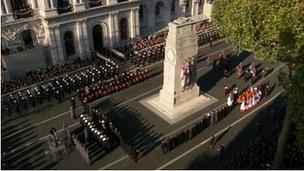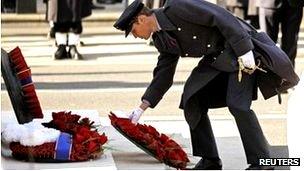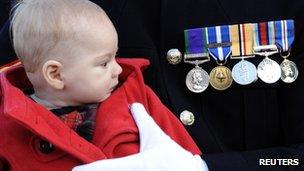Remembrance Sunday: Queen leads tributes at Cenotaph
- Published
The Queen was the first to lay a wreath at the Cenotaph in London
The Queen has laid a wreath at London's Cenotaph as part of the Remembrance Sunday events held to honour the UK's war dead.
Other members of the Royal Family, Prime Minister David Cameron and other politicians, religious leaders and military chiefs also attended.
More than 7,000 ex-servicemen and women marched past the Cenotaph, followed by civilians including 60 war widows.
A two-minute silence was observed as Big Ben chimed.
The Queen laid the first wreath, followed by other members her family, including the Duke of Edinburgh, Prince Charles and Prince William.

Thousands gathered along Whitehall for the annual ceremony
Maj Peter Norton, who won the George Cross for Gallantry after being injured in Iraq, said for Armed Forces personnel it was particularly poignant.
"Most of us also have got personal experiences, we've either lost friends or colleagues over the years.
"You have that common bond between you no matter what cap, badge or regiment you come from and the ability to get together to go over old memories, but also to remember those who can't be here with you really means a lot to most people here," he said.
Lt Gen Sir John Kiszely, of the Royal British Legion, said the commemorations this year were "as important as ever".
"Remembrance Sunday is a time for the nation to unite in its reverence for the British armed forces past and present," he said.
"When we bow our heads in reflection, we remember those who fought for our freedom during the two world wars, but we also mourn and honour those who have lost their lives in more recent conflicts."

Prince William, in his RAF uniform, honoured those who died
Defence Secretary Philip Hammond said the day was important for millions of people.
"The armed services have acquitted themselves incredibly well, of course in Afghanistan on an ongoing basis and also in the operation in Libya over the course of this year.
"The public hugely respects and admires what our service people do and the professionalism with which they do it."
All British troops not on operational duty in Camp Bastion and across Afghanistan observed the two-minute silence.
In Helmand province, a wreath was laid by 18-year-old Private Jake Noble, from Fraserburgh, Aberdeenshire, who said it was "a privilege".
"It's good having a service here, it's more personal, because it's a small group of guys," he said.
It is 90 years since the Royal British Legion instigated the first official Remembrance Day.
Ceremonies were held at the same time across the UK.
In Cardiff, First Minister Carwyn Jones laid a wreath at the National War Memorial
In Edinburgh, First Minister Alex Salmond laid a wreath at the Stone of Remembrance on the Royal Mile
In Belfast, Deputy Lord Mayor Alderman Ruth Patterson and Dame Mary Peters led the tributes at City Hall
In Manchester, Sir Bobby Charlton was among hundreds who gathered to mark the day
In Hampshire, about 1,000 people gathered outside Winchester Cathedral
Street artist Andrew Nurse created a work depicting a poppy on a wall in Scarborough, North Yorks
In Barnsley, South Yorkshire, recently killed soldier Matthew Thornton was remembered
Sunderland hosted what was thought to be the biggest remembrance event outside London
A parade was held in Preston
In Gloucestershire 400 people gathered at a village memorial that was attacked by vandals last month
And people gathered at the top of Great Gable in the Lake District to remember the members of the Fell and Rock Climbing Club (FRCC) who died in World War I
Scotland's First Minister Alex Salmond said: "Remembrance Sunday is the time when every man, woman and child in Scotland should pause and give thought to the immense sacrifice which so many have made to protect our way of life and freedom."
Anti-war campaigners also took part in services across the country.

Scotland's first minister said "every man, woman and child... should pause and give thought"
Chris Nineham, from the Stop the War Coalition, told BBC Radio 5 live they would wear white poppies instead of the traditional red ones.
"Lots of people will be wearing red poppies and laying red wreaths... but we also think that people have the right to wear white poppies and lay white wreaths as a way of saying the waste of life that has occurred in the past should not occur in the future," he said.
Sir David Richards, chief of the defence staff, told the BBC's Andrew Marr Show that the wearing of poppies was "very humbling for us as we go about our daily business not thinking about these bigger issues".
In Oxfordshire, the village of Brize Norton, which has seen five repatriations of soldiers since September, also honoured the dead.
Chairman of Brize Norton Parish Council, Keith Glazier, said: "I cannot quite express how one feels when you see the cortege.
"It's very heart-wrenching and we would rather not see any more."
- Published13 November 2011
- Published11 November 2011
- Published11 November 2011
- Published9 November 2011
- Published11 November 2011